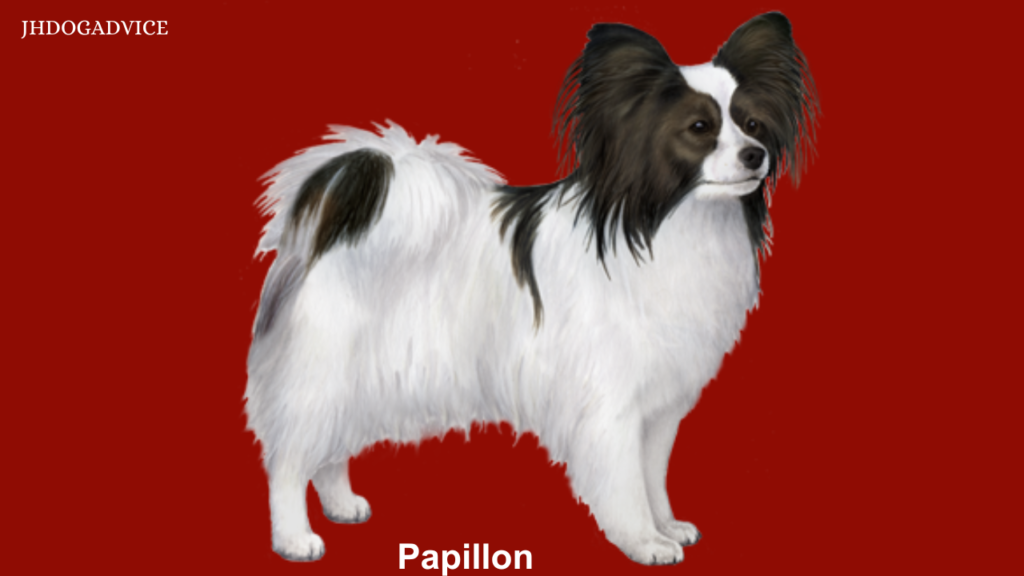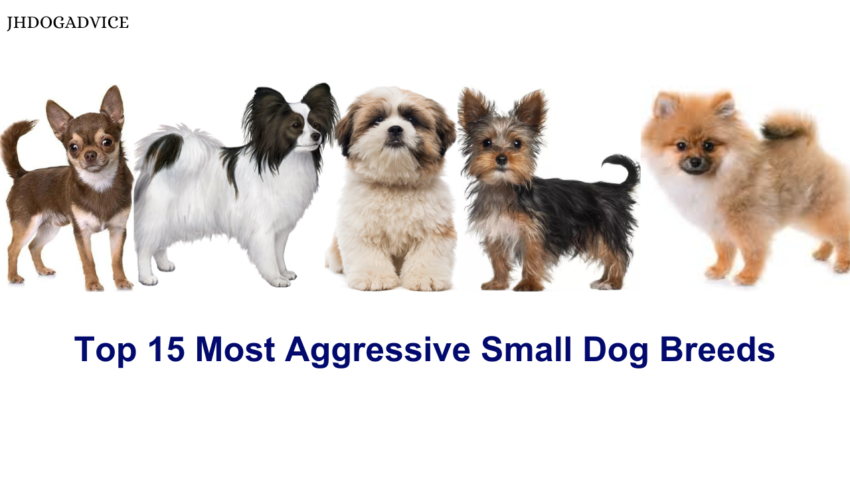Top 15 Most Aggressive Small Dog Breeds
Dogs, often regarded as man’s best friend, come in various sizes, temperaments, and personalities. While small dog breeds are cherished for their compact size and often friendly demeanor, some possess an unexpectedly high level of aggression. Understanding these breeds is crucial for responsible pet ownership, ensuring proper care, and managing their behavior effectively. Here, we explore the top 15 most aggressive small dog breeds, both globally and specifically in India, shedding light on their characteristics and temperaments.
Chihuahua:

Despite their diminutive size, Chihuahuas are known for their feisty and strong-willed nature. They can be fiercely protective of their owners and territory, often displaying aggression toward strangers and other dogs. Chihuahua is a very popular dog and is well known as a lap dog breed. People usually don’t take them seriously and judge them by their size of 4 to 6 pounds. Though these dogs top out at 6 pounds, Chihuahuas have the attitude of a much bigger dog. Many owners think it is cute how closely their Chihuahuas bond with them and how protective they are of their masters. They allow their Chihuahuas to indulge in all kinds of incredibly aggressive behaviors like barking, snarling, lunging, etc. that would never be tolerated in a larger dog.
Dachshund:
Dachshunds are bold and sometimes exhibit aggressive tendencies due to their hunting instincts. Their loyalty can translate into possessiveness, leading to aggression in certain situations. Dachshunds are known for a high prey drive, which can be triggered by smaller and sometimes even larger animals. Dachshunds also tend to be one-person dogs, and protective of their person, which makes them excellent companions for single or elderly people and good watchdogs. They have a very high prey drive as they were originally bred to hunt down small animals, therefore being aggressive is in their genes.
Jack Russell Terrier:
Energetic and intelligent, Jack Russell Terriers possess a high prey drive. Without proper training and socialization, they may demonstrate aggressive behavior, especially towards smaller animals. Jack Russells are small-sized dogs that range from 14 to 18 pounds and are predominantly white with black or tan markings. Their coat can be short-haired, long-haired, or broken [refers to a coat of both long and short hair]. The history of this breed began in England where they were primarily used for fox, groundhog, and badger hunting. The Russell terriers are energetic and stubborn dogs with very minimal patience and are not very tolerant of children.
For more information about DOG BREEDS visit the site.
Miniature Pinscher:
Miniature Pinschers are known for their assertive and fearless personalities. While they can be affectionate with their families, they might display aggression towards unfamiliar people or animals. Small children should always be supervised around them. They were bred to protect, and so just carry out their jobs accordingly. Their size and physical appearance often scare people since they don’t get to know the animal first. Families of this breed are big fans and say they can be relaxed and loving when they know things are okay.
Yorkshire Terrier:

The Yorkshire Terrier, commonly referred to as the Yorkie, is a small but spirited breed known for its elegant appearance and confident demeanor. Despite their adorable appearance, Yorkshire Terriers can be quite territorial and prone to aggressive behavior if they feel threatened or if their space is invaded. Yorkies are small dogs, typically weighing between 4-7 pounds and standing around 7-8 inches tall at the shoulder. Despite their small size, they have a big personality and bring a lot of joy and loyalty to their owners. They enjoy playtime, short walks, and interactive activities that engage their minds.
Shih Tzu:
While generally affectionate, Shih Tzus can exhibit aggression when they feel challenged or provoked. Early socialization is key to managing their sometimes feisty temperament. Known as lion dogs in China where they originated from, they are extremely clever and courageous. But having said that, their bad temper is a problem they do have, you need to train them well from puppyhood to make them obey your commands or they will disobey you every time. If your Shih-Tzu believes they are in charge, they may growl or bite at people they believe threaten their position in the hierarchy. It is crucial to assert your dominance over your dog at a young age, so it does not feel the need to become aggressive about status.
Pomeranian:
Pomeranians are small, fluffy dogs known for their vivacious personality and luxurious double coat. Pomeranians tend to be vocal and assertive. Without proper training, they might display aggression towards strangers or other dogs due to their protective instincts. They have a compact build with a thick double coat that comes in a variety of colors, such as orange, red, cream, sable, black, or blue. Despite their small size, they often have a big personality. They can be affectionate and loyal to their families but might display some independence. They adapt well to apartment living due to their small size and moderate exercise needs.
Lhasa Apso:
The Lhasa Apso is a small and independent breed originally from Tibet, known for its long, flowing coat and confident personality. Lhasa Apsos are known for their loyalty and can be suspicious of strangers, leading to potential aggression if not socialized adequately. Lhasa Apsos are small dogs, typically weighing around 12-18 pounds and standing about 10-11 inches tall at the shoulder. Early socialization and consistent, patient training using positive reinforcement are important. They respond best to gentle and firm guidance. Lhasa Apsos make loyal and loving companions for individuals or families who appreciate their independence, confidence, and watchful nature.
Papillon:

The Papillon is a small, elegant, and highly intelligent breed known for its distinctive butterfly-like ears (which gave it the name Papillon, meaning “butterfly” in French). These small, intelligent dogs can exhibit aggression if not properly trained and socialized. Their assertive nature might lead to conflicts with other animals. Papillons are small dogs, typically weighing around 5-10 pounds (2.3-4.5 kg) and standing about 8-11 inches (20-28 cm) tall at the shoulder. Despite their small size, they are not fragile dogs and tend to be quite confident.
Shiba Inu:
The Shiba Inu is a distinctive and spirited breed known for its fox-like appearance, intelligence, and independent nature. Originally bred for hunting, Shiba Inus can have a strong prey drive and assertive personality, sometimes displaying aggression towards other dogs or animals. They have a compact, muscular build with a curled tail and a plush double coat that comes in various colors, most commonly red, sesame, black, or tan. Training requires patience, consistency, and positive reinforcement. Shiba Inus have a thick double coat that sheds heavily, especially during shedding seasons.
Cocker Spaniel:
While generally gentle, Cocker Spaniels can show aggression due to fear or anxiety, especially when faced with unfamiliar situations or people. They typically weigh between 20-30 pounds (9-14 kg) and stand about 13-15 inches (33-38 cm) tall at the shoulder. They are affectionate dogs that form strong bonds with their families. Early socialization is important to ensure they develop good manners. This includes brushing several times a week, occasional trimming, and proper ear cleaning to prevent infections.
Pekingese:
Pekingese dogs can be possessive and show aggression if they feel their territory or family is threatened. Early socialization is crucial to managing their behavior. Their long, flowing double coat requires regular grooming and comes in various colors, including gold, red, sable, black, and parti-color. Pekingese dogs are affectionate, loyal, and sometimes even a bit stubborn. Early socialization and consistent, patient training with positive reinforcement are essential. They enjoy short walks and indoor playtime but are generally content with moderate exercise. They make great apartment dogs due to their lower activity needs.
Australian Terrier:
The Australian Terrier is a small, sturdy, and spirited breed known for its loyalty, intelligence, and distinctive appearance. With a history as a vermin hunter, Australian Terriers can display aggression towards smaller animals. They require firm training and socialization. These dogs are small, typically weighing between 14-16 pounds (6-7 kg) and standing about 9-11 inches (23-28 cm) tall at the shoulder. Early socialization and consistent, positive training methods are essential. They are loyal and devoted to their families, making them excellent companions.
Cairn Terrier:
Cairn Terriers have a strong prey drive and might exhibit aggression towards smaller animals or unfamiliar dogs if not properly trained and socialized. They typically weigh between 13-14 pounds (6-6.5 kg) and stand about 9-10 inches (23-25 cm) tall at the shoulder. Early socialization and consistent, positive training are essential to channel their intelligence positively. These dogs are active and enjoy playtime and outdoor activities. They thrive in environments where they receive mental stimulation, regular exercise, and lots of love and attention from their owners.
Basenji:
Basenjis are a unique and fascinating breed known for their intelligence, independence, and distinct characteristics. Basenjis have a curious and independent nature, which, without adequate training, can lead to aloofness and potential aggression towards strangers. They are active and energetic dogs that require regular exercise to keep them mentally and physically stimulated. Training a Basenji can be a bit challenging due to their independent nature. Positive reinforcement, patience, and consistency are crucial in training these intelligent dogs.
Top 15 Most Aggressive Small Dog Breeds in the World
When considering dog breeds that may exhibit more assertive or feisty behaviors, it’s essential to note that aggression in dogs is a complex issue and is influenced by various factors including genetics, training, socialization, and individual temperament. However, some small breeds may have a more assertive or territorial nature compared to others. Here’s a list of small dog breeds that are known for their assertiveness, but it’s important to remember that each dog is an individual and behavior can vary widely:
- Jack Russell Terrier
- Pekingese
- Toy Fox Terrier
- Cairn Terrier
- Rat Terrier
- West Highland White Terrier
- Chinese Crested
- Border Terrier
- Cavalier King Charles Spaniel
- Australian Terrier
- Norfolk Terrier
- Silky Terrier
- Boston Terrier
- Brussels Griffon
- Japanese Chin
Top 15 Most Aggressive Small Dog Breeds in India
While aggression in dogs can vary widely based on individual temperament, upbringing, and socialization, certain breeds tend to exhibit more assertive behavior than others. In India, small dog breeds with assertive tendencies might present specific challenges for pet owners. These breeds are noted for traits such as territoriality, protectiveness, or a strong prey drive, which, when not properly managed through training and socialization, might manifest as aggression towards strangers, other animals, or even family members. Here’s an expanded list of 15 small dog breeds known for potentially displaying more aggressive behavior:
- Chihuahua
- Dachshund
- Miniature Pinscher
- Yorkshire Terrier
- Shih Tzu
- Pomeranian
- Lhasa Apso
- Papillon
- Shiba Inu
- Cocker Spaniel
- Bichon Frise
- Havanese
- Maltese
- Miniature Schnauzer
- Toy Poodle
Conclusion:
While aggression can be displayed by small dog breeds, it’s essential to understand that proper training, socialization, and a nurturing environment significantly influence a dog’s behavior. Responsible ownership, early training, and consistent socialization play pivotal roles in managing and mitigating aggressive tendencies in these breeds, ensuring a harmonious relationship between pets and their owners.
By acknowledging the predispositions of these breeds and implementing appropriate training and socialization, pet owners can foster a loving and well-behaved companion, irrespective of breed size or temperament.
